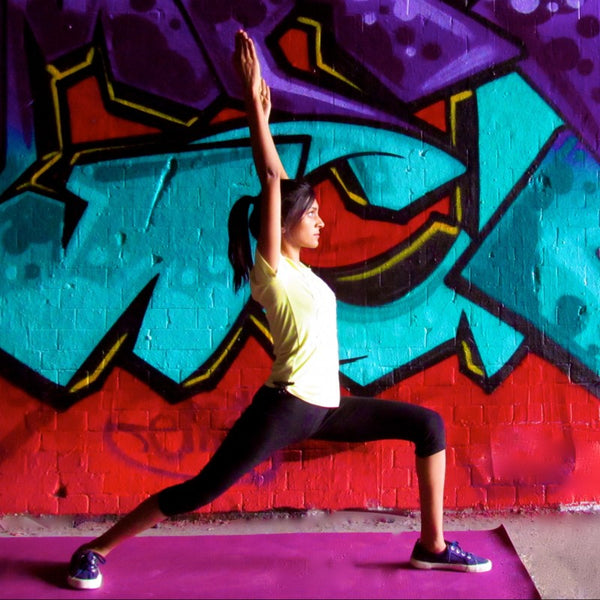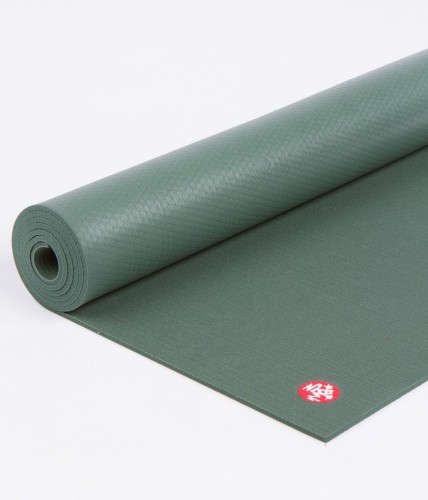
When you start to practice yoga, it is natural to question whether your poses are correct. Doing yoga incorrectly can lead to you feeling uncomfortable and discouraged. Instead of dwelling on how you look, think about building a strong body/mind connection. These tips will help you to achieve the right poses and keep you from feeling awkward during your practice.
To maximize the benefits of your yoga class, arrive early. It can cause anxiety to rush into a class. New students frequently admit feeling nervous before their first yoga class. Anxiety and discomfort can be made worse by arriving late. It is best to arrive on time. You can settle in, get a bathroom and adapt to the room's energy. Ask your teacher if there are any questions about how long it will last.

Get ready for your first yoga class. You need to be there early to ensure you get a good spot. It is also important to practice beginner friendly poses. It is best to avoid eating heavy meals before the class. The movement can cause discomfort in the stomach. You should also avoid eating large meals in the days leading up to your class. It is not a good idea to move around a lot. Talk to your doctor if you have concerns about stomach discomfort.
Respect your teacher. Your yoga instructor is there to help you correct your postures. While hands-on instruction is great, keep in mind that yoga is a personal practice. Every student has different goals and abilities. You can handle this by remembering to have fun and to laugh when you slip up in poses or get stuck with difficult poses. Do not feel guilty if your yoga teacher corrects your posture. It's part of the process and you should be enjoying the process.
For beginners, yoga classes can seem intimidating. Before you join a class, be familiar with the common poses. Don't practice them until you know the name of each pose, as it can be confusing. Instead, you can view photos and look up the names of each pose. Once you are able to identify the most difficult ones, you can make a decision on which ones you will try. Once you have found your perfect yoga spot, you are ready to move on.

Yoga can be challenging for beginners. Do not expect to be able to master it immediately. If you're new to yoga, it may take some time. The most important thing is to be patient as you learn a new skill. Then, you'll be able to focus on the process. An instructor in yoga will guide you through the process of creating a practice that is successful.
FAQ
What's a good workout plan for 7 days?
A seven-day program should include three days of cardio training (running, biking and swimming), two strength exercise (using free weights or weight machines) and one flexibility/core work out (yoga, Pilates). Each activity should be performed at least once each week. The total time for each session should not exceed 45 minutes.
Cardiovascular Exercises: Running, biking, swimming
It is important to complete at least 60 minutes of cardio per week. For best results, aim for 75 minutes per week. Cardio exercises can help improve blood flow and stimulate muscle growth.
Strength Training
While cardio exercises target the heart and lungs, strength training targets the muscles and bones. Strength training is a great way to build lean muscle mass that helps you burn calories even if you are not actively exercising.
Flexibility and Core Workouts
You can strengthen your entire body by strengthening flexibility and core exercises. Both yoga and Pilates are excellent options.
How many calories should you consume each day?
This can vary from person to person. The average is 2000 - 2500 calories per day. It is important to consider your lifestyle and determine how many calories you'll need.
What's the Best Way to Lose Weight?
It is not easy to lose weight. Many people give up because they don’t know what else to do.
You can lose weight by following a few simple steps.
First, ensure that you consume fewer calories per day than you burn. If you consume more calories than what you burn, you will gain weight.
For all of those extra calories to be burned, it is important that you exercise regularly. You have many options, including walking, biking, dancing and jogging.
Third, stop smoking cigarettes or drinking alcohol. These habits will cause you more calories than normal.
Fourth, you should cut back on junk food. You can replace them by healthier choices such as fruits, vegetables or lean meats.
Fifth, you should change your lifestyle to adopt new habits. It is possible to wake up at 5 AM to go to work, or to be more active before you get to work.
Sixth: You must be disciplined, and you must follow your diet plan.
Finally, you have the option to join a gym and take part in an aerobics session to burn off those extra calories.
These simple tips will help you quickly see results.
What does butter do to men?
Butter is one of the best sources of saturated fats. This fat is good for hair and skin health, as well as stronger bones.
Vitamin K, found in butter is an antioxidant that prevents bleeding from cuts. Vitamin K and vitamin B work together to prevent any bruising.
Butter also contains minerals like calcium, phosphorous and potassium. These elements are good for teeth and bones.
Butter does have some drawbacks. Butter is high in cholesterol. Some studies show that consuming too much cholesterol may increase the risk of developing cardiovascular disease.
Butter is high in saturatedfat, which contributes both to obesity, and raises cholesterol.
Butter can be spread on bread, but you don't have to dip it into soups or salads if you absolutely must. Bread absorbs more oil than potatoes or pasta.
Statistics
- According to the American Academy of Dermatology (AAD), men over 50 are at a heightened risk of developing it. (healthline.com)
- An estimated calorie range for moderately active adult males falls between 2,200 to 2,800 calories per day, depending on age. (eatright.org)
- The PRS enabled risk stratification for overall prostate cancer and lethal disease with a four-fold difference between men in the highest and lowest quartiles (HR, 4.32; 95% confidence interval [CI], 3.16-5.89). (pubmed.ncbi.nlm.nih.gov)
- Candidates and applicants must pass all four tests at 70% (minimum level) to graduate from Basic Deputy U.S. Marshal (BDUSM) Training. (usmarshals.gov)
- According to the American Heart Association, blood pressure should be checked at least once every two years, beginning at age 20. (my.clevelandclinic.org)
External Links
How To
How do I lose weight while working out?
Exercise burns calories through increased metabolism and oxygen consumption.
At moderate intensity, you will lose weight easily.
To burn fat while exercising, follow these tips:
-
Cardio exercises include walking, running, swimming, cycling, running and jogging.
-
Do 30 minutes of exercise three times a week.
-
You can add strength training into your exercise routine if you're looking to lose even more weight.
-
Avoid intense exercise. You can build muscle without breaking down muscle tissue.
-
When exercising, make sure to drink lots of water. Water helps flush out toxins and keep your body properly hydrated.
-
After working out, drink low-fat protein shakes. Protein shakes can help boost energy and repair muscles.
-
Smaller meals are better for you.
-
Don't skip breakfast! Skipping breakfast can make you tired and sluggish.
-
Take care of yourself mentally. Stressful situations may slow down your metabolism.
-
Keep a positive attitude. Studies show that people who believe they are overweight gain more weight then those who think they are attractive.
-
Get enough sleep. A lack of sleep makes it difficult to lose fat.
-
Always be active. Keep moving every hour.
-
Maintain a healthy diet. A healthy diet will help you feel fuller for longer.
-
Find relaxation methods. Your body won't release stress hormones that cause muscle tissue destruction if you have a tense mind.
A balanced diet includes all essential nutrients needed for growth and development.
Consider eating six small meals daily instead of three big ones. This gives your body more time to digest the food you eat.
For strong bones to be maintained, you need approximately 500mg of calcium per day. Calcium can also be found in milk products, yogurt, fortified Soy beverages, orange Juice, cereals and bread.
Calcium comes from leafy green vegetables, beans, tofu, nuts, seeds, and cheese.
Your body needs vitamin D to absorb calcium. It's found in fatty fish, egg yolk, and some fortified foods.
Vitamin E is vital for your skin's health. It can be found as a vegetable oil, wheat germ, peanuts or almonds.
Zinc is essential for healthy immunity and wound healing. Zinc can be found as a mineral in oysters.
Zinc deficiency can cause fatigue, loss of appetite, depression, and impaired immunity.
Eating too much sugar causes insulin resistance, which increases blood glucose levels. Insulin resistance can lead to weight gain.
Insulin resistance develops when there are high levels of free radicals in the bloodstream. Free radicals can be molecules with unpaired electrons that cause damage to cell membranes.
The main sources of free radicals are food additives.
Free radical damage may lead to cancer, heart disease diabetes, arthritis, asthma and other conditions.
To prevent free radical damage, eat a healthy diet rich in antioxidants. Antioxidants protect against oxidative damage.
Vitamin C can be found in citrus fruits. Beta carotene can be found in carrots. Sweet potatoes. Tomatoes. Carrots. Sweet potatoes. Spinach. Broccoli. Cantaloupe. Vitamin E is found in nuts. Olive oil, avocados.
Additional antioxidant nutrients include selenium and copper, manganese and zinc.
Selenium helps to protect cells against free radicals and oxidative stress. Selenium is found in Brazil nuts, tuna, liver, kidney, shrimp, cod, turkey, beef, lamb, pork, and chicken.
Copper protects eyes, brain, lungs and red cells. Copper is found in shellfishes, poultry, meat, organ meats, and other foods.
Manganese forms an essential part of bone structure. Manganese is found as a component of bone structure in brown rice (spinach, bananas), prunes, raisins and oatmeal.
Zinc is important for healthy growth, reproduction, and wound-healing. Zn can be found in lean cuts, white fish, poultry, eggs, and other foods.